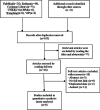Effects of different integrase strand transfer inhibitors on body weight in patients with HIV/AIDS: a network meta-analysis
- PMID: 35114968
- PMCID: PMC8811997
- DOI: 10.1186/s12879-022-07091-1
Effects of different integrase strand transfer inhibitors on body weight in patients with HIV/AIDS: a network meta-analysis
Abstract
Background: Global antiretroviral therapy has entered a new era. Integrase strand transfer inhibitor (INSTI) has become the first choice in acquired immunodeficiency syndrome (AIDS) treatment. Because INSTI has high antiviral efficacy, rapid virus inhibition, and good tolerance. However, INSTIs may increase the risk of obesity. Each INSTI has its unique impact on weight gain in patients with human immunodeficiency virus (HIV)/AIDS. This study systematically assessed different INSTIs in causing significant weight gain in HIV/AIDS patients by integrating data from relevant literature.
Methods: PubMed, Embase, Cochrane Library, China National Knowledge Infrastructure (CNKI), Chinese Biomedical Literature Database (CBM), China Science and Technology Journal Database (VIP), and Wanfang databases were searched to find studies on the influence of different INSTIs in weight gain. Data on weight change were extracted, and a network meta-analysis was performed.
Results: Eight studies reported weight changes in HIV/AIDS patients were included. Results of the network meta-analysis showed that the weight gain of HIV/AIDS patients treated with Dolutegravir (DTG) was significantly higher than that of Elvitegravir (EVG) [MD = 1.13, (0.18-2.07)]. The consistency test results showed no overall and local inconsistency, and no significant difference in the results of the direct and indirect comparison was detected (p > 0.05). The rank order of probability was DTG (79.2%) > Bictegravir (BIC) (77.9%) > Raltegravir (RAL) (33.2%) > EVG (9.7%), suggesting that DTG may be the INSTI drug that causes the most significant weight gain in HIV/AIDS patients.
Conclusion: According to the data analysis, among the existing INSTIs, DTG may be the drug that causes the most significant weight gain in HIV/AIDS patients, followed by BIC.
Keywords: Body weight; HIV/AIDS; Integrase inhibitors; Network meta-analysis.
© 2022. The Author(s).
Conflict of interest statement
All authors declare that this research was conducted in the absence of any commercial or financial relationships that could be construed as potential conflicts of interest.
Figures
References
-
- Mogadam E, King K, Shriner K, Chu K, Sondergaard A, Young K, Naghavi M, Kloner RA. The association of nadir CD4-T cell count and endothelial dysfunction in a healthy HIV cohort without major cardiovascular risk factors. SAGE Open Med. 2020;8:2050312120924892. doi: 10.1177/2050312120924892. - DOI - PMC - PubMed
-
- Ceulemans A, Bouzahzah C, Prat I, Urassa W, Kestens L. CD4-T cell enumeration in human immunodeficiency virus (HIV)-infected patients: a laboratory performance evaluation of Muse Auto CD4/CD4% system by World Health Organization prequalification of in vitro diagnostics. PLoS ONE. 2019;14(1):e0209677. doi: 10.1371/journal.pone.0209677. - DOI - PMC - PubMed
-
- Vangipuram R, Tyring SK. AIDS-associated malignancies. In: Meyers C, editor. HIV/AIDS-associated viral oncogenesis. Cham: Springer; 2019. pp. 1–21. - PubMed
Publication types
MeSH terms
Substances
LinkOut - more resources
Full Text Sources
Medical




